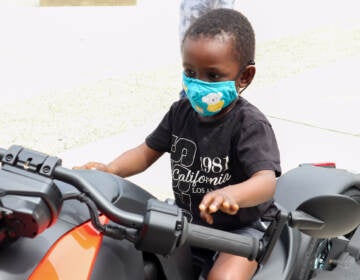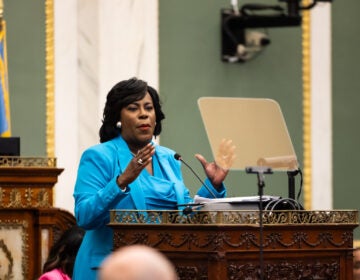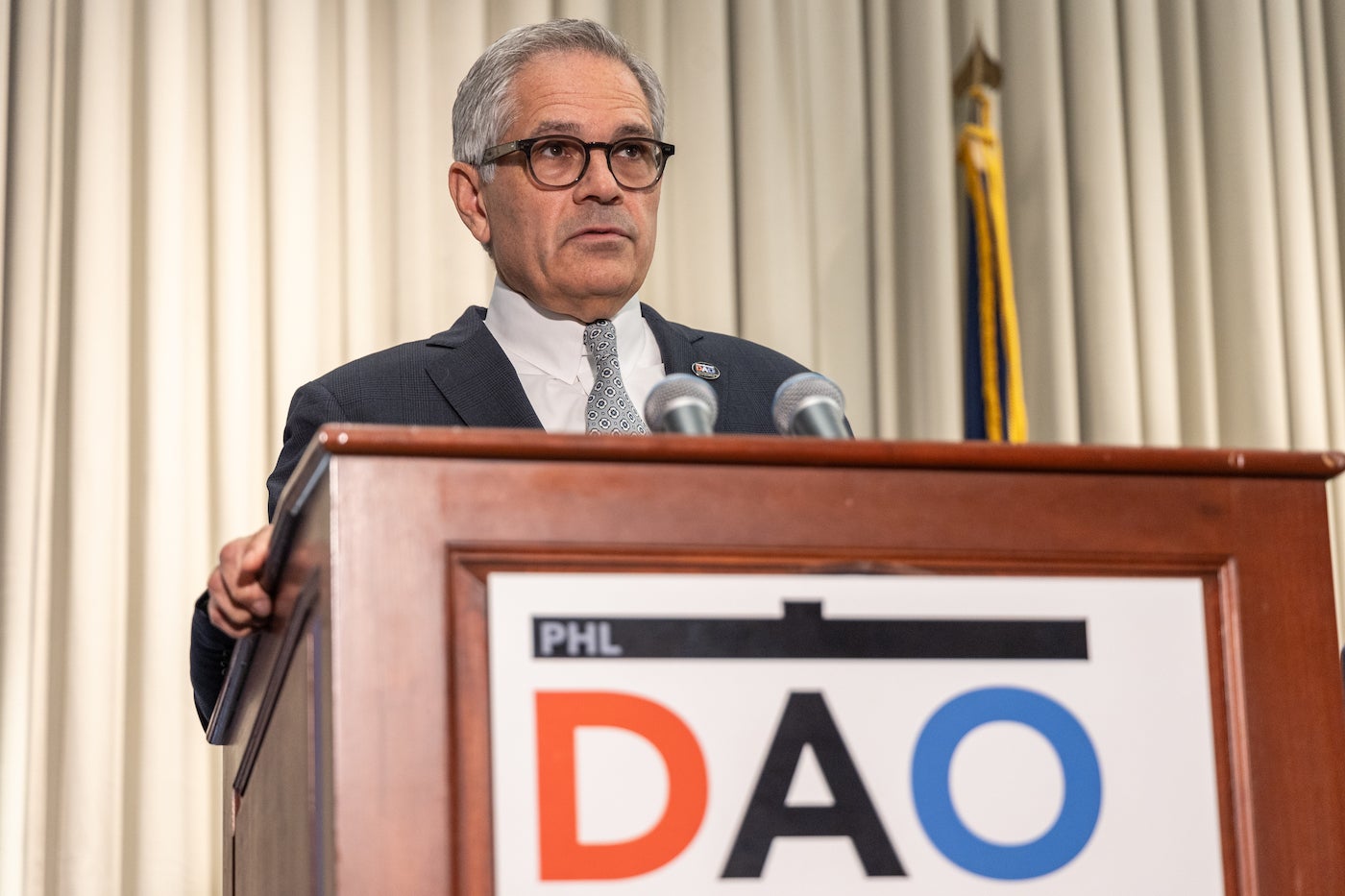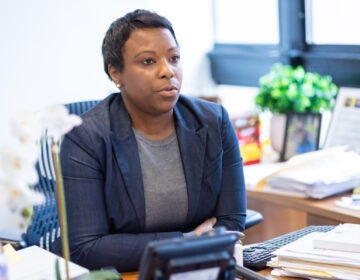Will ongoing gun violence bring a stop-and-frisk resurgence to Philly? It wouldn’t be the first time
The much-criticized, historically racist policing tactic never actually went away, but in recent years officials had decried it and the city had moved away from its broad use.
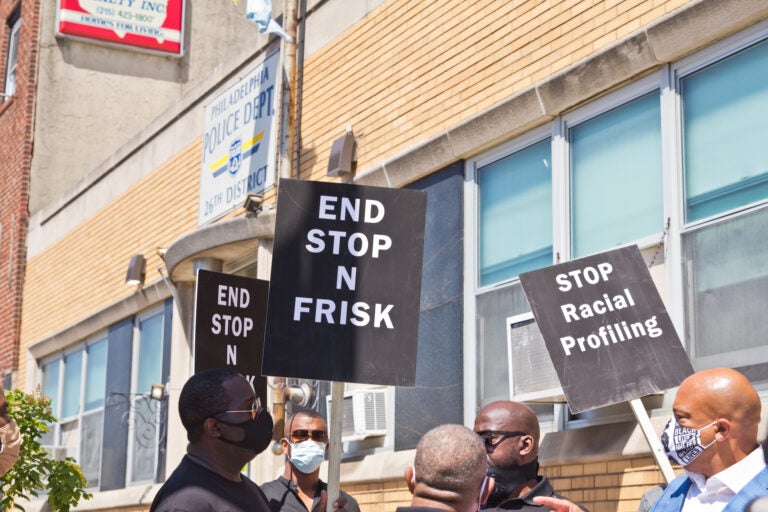
Community groups working against violence in the city of Philadelphia protested stop-and-frisk outside the 26th Police District in Fishtown. (Kimberly Paynter/WHYY)
Philadelphia has for several years been moving away from the much-criticized, historically racist policing tactic known as “stop and frisk.” But with violent crime rates stubbornly high, constituents concerned, and elections approaching, some City Council members seem to be opening the door to revisit the practice.
It’s a move that has some of their colleagues — and criminal justice experts — wary.
The comments from City Council leadership came after two police officers suffered minor injuries in an Independence Day shooting that left fireworks watchers scrambling to escape. It was a high-profile incident in what has already been a violent summer.
Council President Darrell Clarke said he has been hearing from “a lot of citizens” who are asking when the city will “look at stop-and-frisk in a constitutionally-enacted way.” A spokesperson for Clarke said city and state laws against illegal guns “should be much better utilized.”
Majority Leader Cherelle Parker, who is expected to announce a run for mayor this year, weighed in with similar thoughts. She said the city should use all its tools to address gun violence, including “the constitutional use of stop and frisk.”
Parker had previously sponsored a mostly symbolic amendment to the city’s charter that called the PPD to end “unconstitutional stop and frisk.” Clarke supported it too, and it passed council and got approval from voters.
Parker maintains there’s a key distinction between her past and current position: constitutionality. Courts have held that under the Fourth Amendment, police cannot stop someone unless they have reasonable suspicion that the person has committed a crime, or they are currently committing one, or they are about to. Police can’t frisk the person unless they have reason to think they’re armed and dangerous.
“I was proud to [call for an end to illegal stop and frisk],” Parker told WHYY News. “I’m going to continue to advocate for it. But used constitutionally, and if there is reasonable suspicion, I want law enforcement to be able to do their job … I don’t apologize to anyone for that perspective.”
Khalil Gibran Muhammad, a professor of history, public policy, and race at Harvard’s Kennedy School, said he doesn’t think it’s surprising Philly politicians are bringing up stop and frisk amid rising gun violence.
“In good times, when crime and violence are low, people are willing to think about alternatives,” he said, referencing things like diversion programs and sentencing reform. “In bad times, people do revert to a kind of need, and a bloodlust, for immediate results.”
Similar shifts have taken place in other cities. New York City last year elected Mayor Eric Adams, a former police officer and advocate for more aggressive policing. In San Francisco, voters recently ousted their progressive district attorney, Chesa Boudin.
But Muhammad also said he thinks there’s a specific, fundamental issue with politicians advocating for “constitutional” stop and frisk: any push to have police make more stops tends to result in more illegal stops.
“It’s not clear to me that there is any such thing as a legal practice of stop and frisk,” he said.
Philly never fully quit stop and frisk
This question of whether police are capable of conducting only legal stops and searches has troubled Philadelphia for the past decade.
Stop and frisk never actually went away in the city, but in recent years police had begun moving away from broad use of the practice.
The shift began in 2010, when the Pennsylvania ACLU and a private law firm sued the city in federal court on behalf of a group of Black and Latino men whom police had stopped solely because of their race or ethnicity. The parties settled the case the following year, with the city agreeing to a consent decree.
Known as “the Bailey agreement,” it stipulated that per the federal and state constitutions, Philadelphia police must have “reasonable suspicion of criminal conduct” in order to make a stop, and that frisks should be undertaken “only where there is reasonable suspicion that the person stopped is armed and dangerous.” The city also agreed civil rights lawyers would monitor the PPD’s stop and frisk data for racial disparities.
In 2009, before the lawsuit, Philadelphia had been performing more stops per capita than any other major city. Almost 90% of the people stopped were Black or Latino.
Since then, total stops have decreased, as have illegal ones — but they haven’t gone away.
A 2020 report found that around 16% of stops were still illegal, as were 32% of the pat-downs police performed. And Black Philadelphia residents — who make up about 44% of the city’s population — made up 71% of all stops in the second half of 2019 and were 50% more likely to be illegally stopped, especially for minor “quality of life” crimes, like panhandling or carrying an open container.
Last year, a judge ordered a new step: a pilot program in a Northwest Philly police district in which officers would no longer automatically stop and frisk people for those quality of life offenses. The logic is that enforcement for these offenses is especially racially disparate, and doesn’t have much impact on safety.
As of June, five more districts have been added to the pilot.
‘People are in fear’
Disagreement over stop and frisk isn’t limited to politicians.
Asa Khalif, one of Philadelphia’s most prominent Black Lives Matter organizers, has advocated against stop and frisk for years. To him, these recent comments from Parker and Clarke felt politically motivated — designed to appeal to voters worried about gun violence, while ignoring “the pain and the anguish that Black and brown people suffered under stop and frisk.”
“They’re going to get the white vote,” he said. “I’m not afraid to say it.”
Khalif said he hasn’t heard from any Black people who support stop and frisk. But Don Jackson, an anti-violence advocate who runs an intervention group called Urban Navigation, says he hears from lots of people who like the idea. Like Khalif, Jackson is also Black.
Jackson wants guns off the street, and thinks the situation is bad enough that the mayor should call a state of emergency and reinstate random stops to look for guns. Not drugs, not outstanding bench warrants, not expired vehicle registrations — just guns.
He acknowledges an approach like that probably wouldn’t hold up in court. But he’s convinced: “If they stop between 1,000 and 1,500 people…I guarantee you that there will be less firearms on the street.”
Even the elected officials who say they’re open to stop and frisk don’t want to go that far — and others have come out strongly against any revival of the procedure.
Three progressive City Council members, Kendra Brooks and Helen Gym, who serve at-large, and Jamie Gauthier of District 3, responded to their colleagues with a statement saying that “grasping at a failed policy of the past not only sows distrust, it hampers the community safety and violence interruption investments led by our Council body.”
“What I sense is happening is that people are in fear because of what’s going on in the city, because of the dramatic spike in gun violence,” Gauthier said. “When people on council are calling for revisiting stop and frisk…it sounds like people are harkening back to how Philly was in the eighties and nineties,” she said. “That’s a scary prospect.”
Plus, Brooks said, studies have shown that stop and frisk doesn’t really get guns off the street — though it does damage trust between police and the communities they patrol.
The ACLU’s 2020 report on Philadelphia stop and frisk found a very small number of stops actually turned up illegal firearms. Police seized just 30 across 3,993 stops analyzed in that report, and in 99% of the 475 frisks reviewed from that period, police also did not take guns.
In New York City, which employed aggressive stop and frisk for more than a decade, a review by the New York Civil Liberties Union found that in more than five million total stops from 2002 to 2013, police recovered 7,778 guns — that’s a gun in 0.2% of all stops.
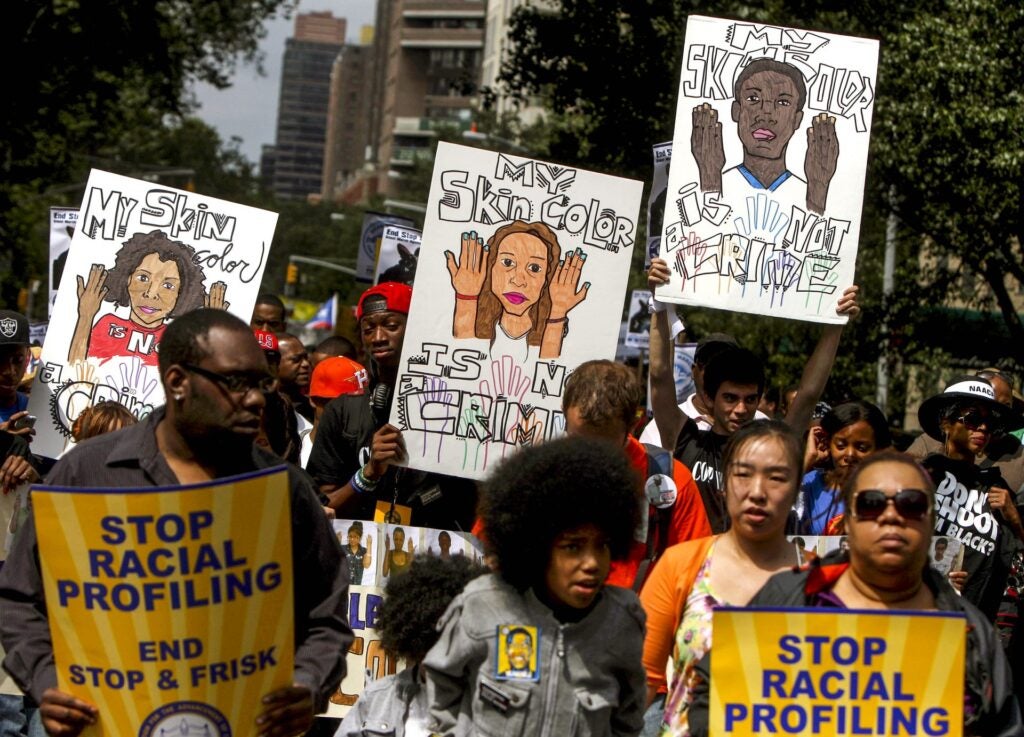
For now, no one on council has proposed a policy change around stop and frisk — Parker said she thinks it’s not “the job of the elected legislator” to tell police how to do their jobs — and the city’s programs aimed at reducing the practice are still in effect.
But Muhammad, the Harvard academic, said he remains convinced that this period of high crime could have lasting policy implications in lots of cities. After all, it has happened before.
“All the historical work that’s been done to talk about the limits of policing seems not to stick in times like these,” Muhammad said. “Culture is hard to change and slow to change. But increasing your police budget is one roll call vote away in the next city council meeting. So that’s what people tend to do.”
WHYY is your source for fact-based, in-depth journalism and information. As a nonprofit organization, we rely on financial support from readers like you. Please give today.




